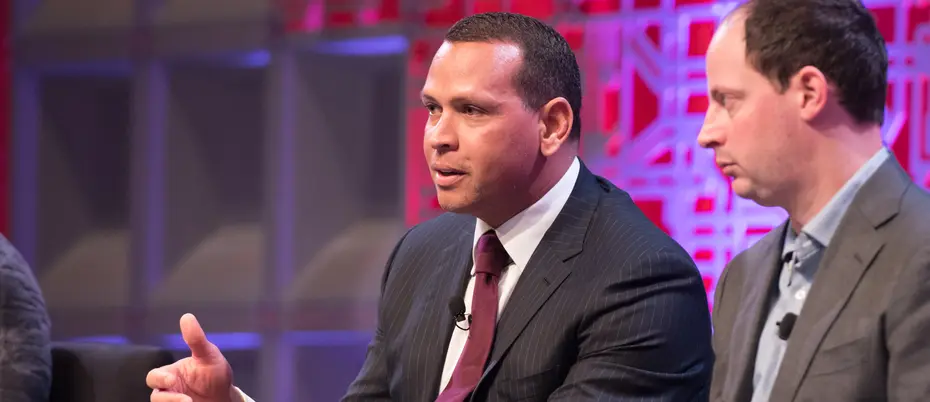Career
When Alex Rodriguez joined a business and tech podcast
You don’t get 22 years in Major League Baseball just because you can hit. Here’s A-Rod’s take on longevity and the intangibles sabermetrics can’t cover.
Over a long career in Major League Baseball, Alex Rodriguez recorded 696 home runs, 3,115 hits, and a record 25 grand slams. The career highlight he’s most proud of, though, is 2,287 strikeouts, which is fifth all time.As Rodriguez said in a new podcast interview with MIT Sloan’s Andrew McAfee, the record is a reflection of his longevity and durability, given that the average career of a Major Leaguer is less than six years. Rodriguez played for 22.
“If you care, if you have a passion, if you have the work ethic and you're smart about it, I think you can play well into your 40s,” he said.
In his conversation with McAfee, co-director of the MIT Initiative on the Digital Economy, Rodriguez talked about the limits of big data in baseball, the lessons he learned while serving a lengthy suspension, and how he hopes to help teenagers today prepare for a successful future.
On the limits of sabermetrics
The so-called “moneyball” approach to baseball player evaluation has exploded in the last two decades. Rodriguez estimated that one or two teams had staff devoted to sabermetrics and data analysis when he made his debut in 1994, compared to nearly every team today.
Rodriguez said there’s an “enormous place” for statistical analysis and evaluation in baseball — but, he added, “I do think that there's a blind spot right now between the human element and sabermetrics.”
For example, general managers and players alike don’t worry much about hitters who strike out a lot, provided they hit the ball hard when they do make contact. In other words, a .200 batting average and 200 strikeouts in a season is acceptable if a player hits 30 home runs and drives in 100 runs.
Rodriguez said he disagrees with this approach because it doesn’t help players and teams prepare for the baseball postseason, when games are more competitive.
“In order to win in October, you need people that can put the ball in play, move the ball forward [against] great pitching,” he said. “In the postseason, one run equals three runs. You have cool weather, you have great pitching, you have very good defense, so runs are at a premium. While sabermetrics works for the first six months, ironically it doesn't work for the most important month.”
Statistics also can’t measure the intangible impact of players such as Boston Red Sox second baseman Dustin Pedroia, said Rodriguez. At 5 feet and 7 inches, Pedroia is one of the shortest players in the game.
“He is one of my favorite players, because you cannot measure how tough he is,” Rodriguez said. “You cannot measure his confidence. You can't measure that he arrives at the stadium at 11 a.m. to get ready to compete [for a 7 p.m. game] and represent Boston.”
On bouncing back and building relationships
Rodriguez served a 162-game suspension in 2014 after he admitted to using steroids earlier in his career. He said he is not bitter about serving the suspension; nor does he blame anyone else.
“I only have one person to be mad at, and that's myself. I look in the mirror, and that’s who [screwed] up,” he said. “You have to turn the lens inward and understand that you made a mistake and you have to be accountable. I let people down — and that's on me.”
Rodriguez said his suspension taught him about the importance of building better relationships with fellow players, coaches, fans, and the front office. It was New England Patriots owner Robert Kraft who encouraged him to focus on building bridges, not burning them, he said.
“If I had to do it again, I don't think I would have focused so much on the big contracts,” he said. (Rodriguez signed a 10-year, $252 million deal with the Texas Rangers in 2000 and a 10-year, $275 million deal with the New York Yankees in 2007.) “I would have really worked closer with management and ownership to do something that's more win-win long term, and have that type of fluidity and open dialogue.”
On preparing teenagers for the future
Rodriguez retired from baseball in 2016. In addition to working as a broadcaster for ESPN and FOX, he has partnered with nonprofits such as the Boys & Girls Clubs of America and Project Destined, which teaches teenagers in urban areas how to invest in real estate and improve their communities.
“We want to teach our kids, especially from age 14 to 19, that there is a different way. We empower them with information and demystify all these fancy words like cap rates and interest,” he said.
Part of the motivation is helping teenagers learn to succeed on their own. When a football player on scholarship sees his grades slip, the head coach gets tutors and mentors to help him, Rodriguez said.
“If you're someone who's good at math or science and you have a setback, there's no one that's going to help you. The more we can kind of lean into really smart, young people, and inspire them, and kind of make it fun, then I think we have a chance to help,” he said. “I do believe that knowledge is power. As corny as it sounds, I do believe it.”




